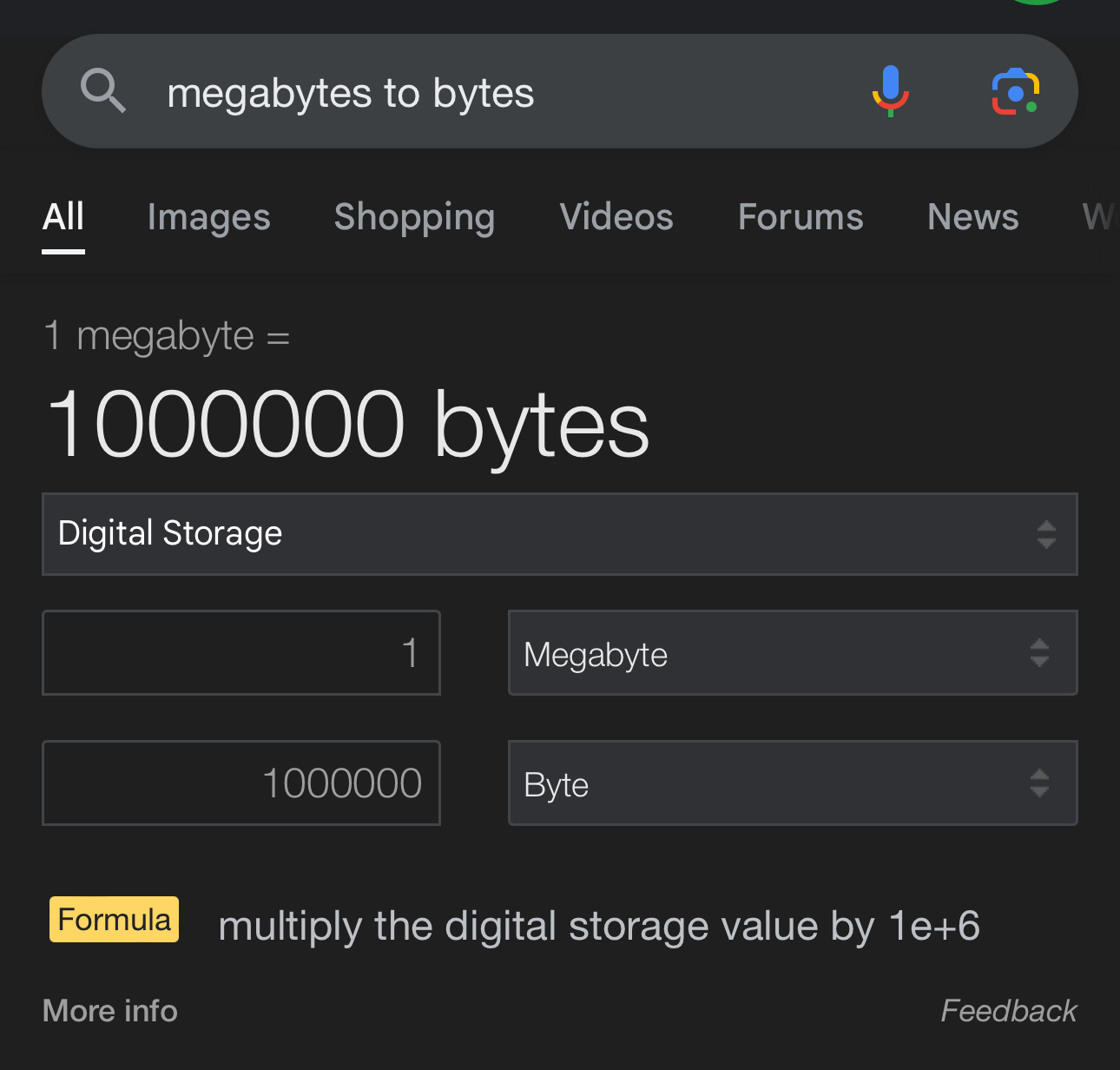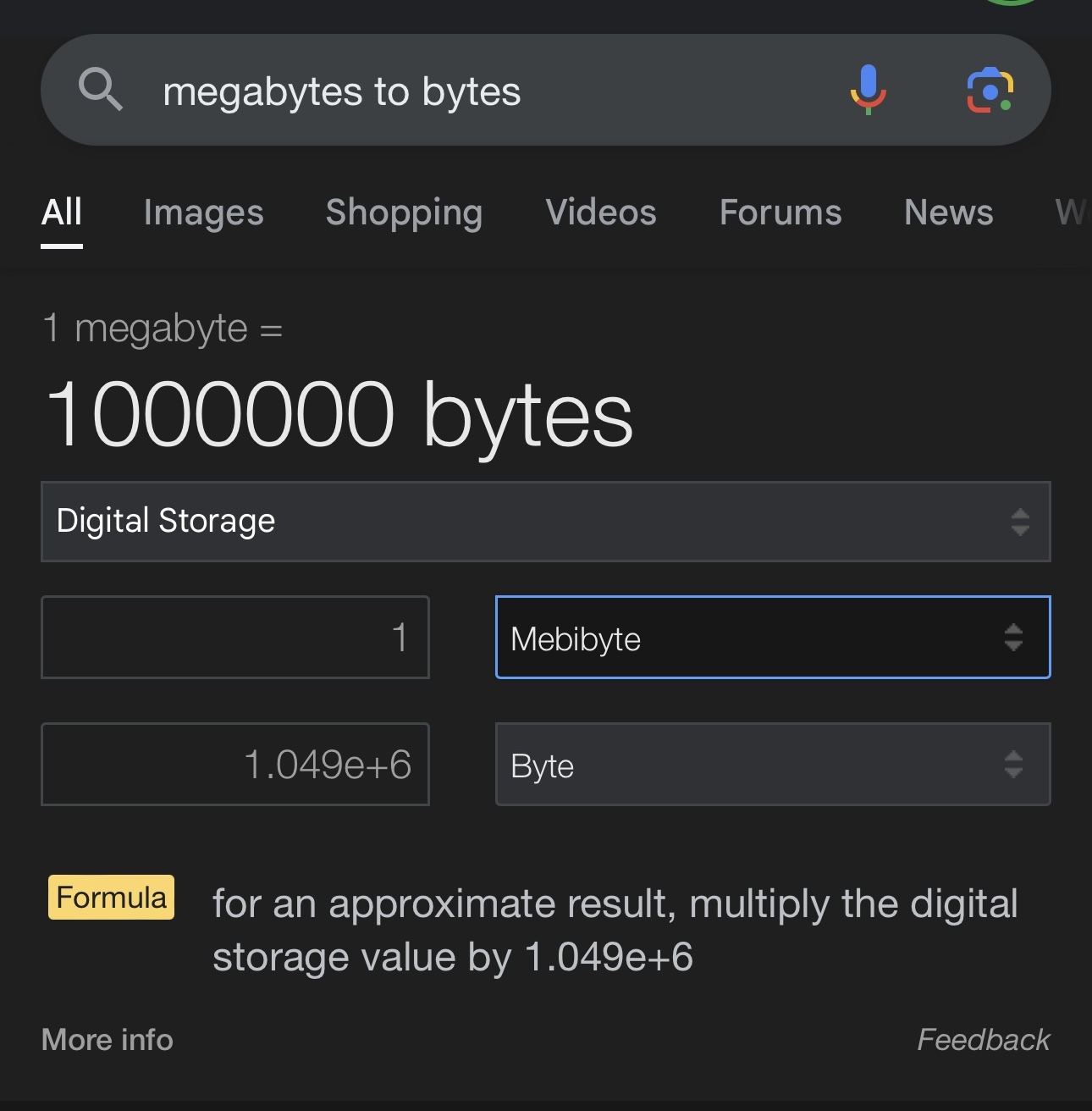

You literally spent an entire comment explaining why you should not use scientific notation and now you’re asking why I might prefer precision in byte arithmetic?
Good luck with that.


You literally spent an entire comment explaining why you should not use scientific notation and now you’re asking why I might prefer precision in byte arithmetic?
Good luck with that.


If I ignore what’s in the search bar, I remember that the prefix “mebi” means 2^20 and use a calculator. Your point doesn’t make sense because you’re asking us to get mad at a tool intended to convert scientific units for using the bog standard scientific notation. Byte math uses powers of 2 ergo we should use a calculator that isn’t explicitly set up for rounding.


When you search “megabytes to bytes” the units are correct and the number is one. If you edit the form, the number might not be one and the units might not be correct. Changing units highlights the unit input.
OP’s ostensible point posting on this community is that searching “megabytes to bytes” gave “mebibytes to bytes” in the calculator but OP’s image shows OP has changed the calculator.


Here is what I get when I complete the search.

And here’s what I get when I intentionally change the units. Notice the color difference?



In case you want to fact check this post, I highly recommend Glyn Moody’s Rebel Code. It’s a nice, fast read and covers all sorts of cool shit. I’d love to see a sequel covering newer events.
(Edit: OP is facetious; mine is only facetious in that it references OP)


There are valid reasons to use one instead of the other. In most cases there isn’t a difference to the end user.


If you find the relevant department and start harassing them on Twitter and other socials at least once a day they will eventually fix it. This has happened before with other departments and security issues. My record is eight days.
I am still mystified by IDE VCS tools. It’s usually faster for me to do a quick CLI shuffle than use the IDE.
The only other time rewriting history might be bad is when you’re working on a shared branch, which is the point of not rewriting main. If you are working solo on a branch, its history is only what you merge into main so it doesn’t fucking matter at all. If you’re not working solo, maybe you need to adopt a similar process or look at how you’re not working solo. The only time I touch another dev’s branch is at the PR stage and only for quick corrections or missing knowledge so it doesn’t matter if they rebased before or honestly rebase after before the final merge.
No you just do a rebase to bring it in. Assuming you’re making atomic commits you shouldn’t have a ton of merge conflicts. If you have to do this a lot, your branch scope is really bad and the problem isn’t in how you’re using got, it’s in how you’re slicing work.


Add Istio and no one will be able to fire you without fucking up mutual TLS


Monoliths are the answer to bad microservices. Microservices are the answer to bad monoliths. It’s all cyclic and four different architects are going to have fifteen different opinions on how your system should be built. Do the thing that makes sense for your team and try to stay flexible.


Absolutes in programming tend to lead to bad designs. This is more a “I’m gonna stir up some shit on Twitter” post than real wisdom.
The same shit happened last summer when AWS came out with their “we dropped microservices for a monolith and look at our speed increase” article which ignored good design principles. Sometimes you should split things over business domains so you can deploy and code independently. Sometimes Kubernetes is the best way to handle your scale needs. The stories we normally read are about people doing it wrong (eg AWS making a bunch of microservices inside a domain sending fucking gigs of data between what should have been functions in a single service). Inexperienced folks don’t always know when to move from their minimum viable solution to something that can scale. That doesn’t mean you remove these things, it means you train on when you need them.
Should we abandon design patterns because singletons or flywheels aren’t the correct solution all of the time?


If you want convenience, Google Books is pretty solid. Just make sure you have all of your books and are only uploading to Google. If you buy from Google, you’ll run into the same problem. I organize via Calibre and use it to push to both Google and a Kobo.
I personally have all my ebooks and use Google Books to read on all my devices. It’s more convenient than trying to self host stuff. When Google eventually drops Google Books I will have to figure out what to use.


This picture is kinda wimpy. Zaslav had led the company through a total stock drop of almost $16 per share yet his comp has gone up almost 100% based on the figures I’ve been able to find. Granted he’s not getting the lucrative options he started with but that doesn’t seem to stop the other comp from going up.




Do you have trouble in other programs with Discord running, especially resource-intensive ones? That might have been a better way for me to phrase that.


I agree with that. I think that there are people that want that deeper level. Most of your users are not going to fit into that, though. If you’re only supporting your power users, you will eventually wither and die as your power users leave.
I first bought a book with Red Hat Linux 6 or 7 in the early aughties (pre-RHEL/Fedora split). While I have actively participated in the technical improvements of project since then, I have typically stayed out of the social aspects.


I can count the number of projects where I wanted immediate feedback from random people on no hands. I do not think there are enough hands in my state to count the number of projects I’ve crawled docs and commentary from search engines. My use case for a community is an asynchronous repository of knowledge and issue tracker. Discord does none of those things.


Discord performance is inversely proportional to the number of servers you’re in. Until Discord addresses this, it’s a shit tool for this use case unless you participate in a tiny number of servers in one facet of your life. Unlike chat tools like Slack that allow you to focus one server or community tools like forums, Lemmy, or VCSaaS which don’t consume resources when you don’t use them, Discord just tanks everything. Since you can’t easily hop in and out (something community tools let you do because, you know, you’re not constantly polling the server), you can’t self regulate.
Every single gaming community, coding community, project, store, hobby group, friend group, and professional group (study group too) has their own Discord. It’s a goddamn nightmare because Discord does not prioritize basic community functionality. Voice and streaming kick ass, but I need some server management and resource optimization.
I can’t find this being a problem. What circles do you move in where “jerk” is a problematic word?